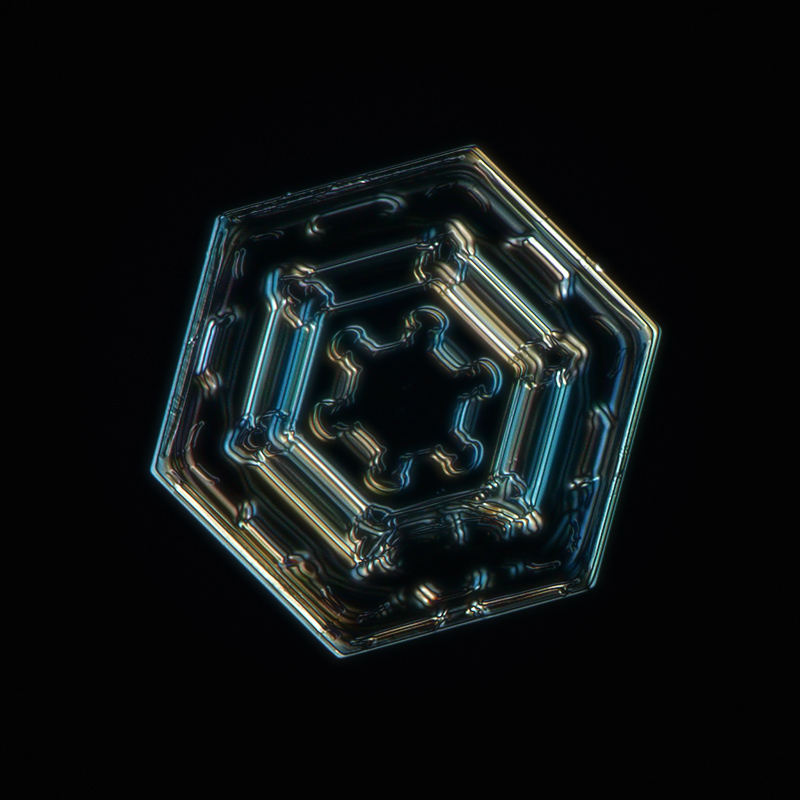Pollen factory at work
Stamen of vegetable marrow with pollen grains. These grains are slightly smaller than pollen of common hollyhock, and have similar shape (sphere with small spikes), but on these grains we can see also bigger spikes. For comparison, here you'll find an electronic microscopy image of marrow pollen grain:
sciencephoto.com/media/33205/view
Gear: my usual "snowflake" macro setup (i described it in article about snowflake macro photography). Daylight from left side, no diffusor, no reflector. Averaged stack of 64 identical shots.
Here is my first photo in this series: very big pollen grains of Alcea Rosea, separated on black glass:
Stamen of Field Scabious (Knautia Arvensis) with pollen
This is macro photo of single stamen inside a flower field scabious, or Knautia Arvensis with grains of pollen. This plant is common around Moscow and in the parks of the city (we call these flowers "короставник"). Stamens of this flower produce so small pollen grains that they are beyond capabilities of my current optics: on this picture, we cannot see exact shape of grains. But pink color of pollen is real, it is not cast by flower petals, which you see at background: when i transferred this pollen at black glass, grains still looks pink on camera screen.
Prints available at Artist website, RedBubble.com.
Licenses for commercial use - at Shutterstock.com, 500px.com.

Pollen grains of Field Scabious - full scale
I've found a page with images of Knautia Arvensis pollen grains, obtained by scanning electron microscope, so you can see their exact shape.
For this image, i've used my trusty "snowflake" macro setup (i described it in article about snowflake macro photography). Daylight comes from left side, and reflected from right side with aluminium foil.
I used focus stacking and averaging techniques: 12 groups of photos with different focus was taken, each group contained 10 identical shots for averaging. After assembling object, i've prepared background (averaged all 120 source RAW photos - for better smoothness of color gradients with no visible traces of noise) and combined object and background with manually painted mask.
Here is next photo - stamen of vegetable marrow with big pollen grains:
Machinery of winter II
This small hexagonal plate snowflake, around 1,5 millimeters in diameter, have surprisingly complex details on it's surface, resembling some sort of mechanical design. I have many other crystals of this type in my snowflake archive. These tiny and simple crystals are easy to process, compared to large and fancy ones; but next snowflake will be big, dark and complex. :)
This crystal was captured on glass with LED back light, using additional lens Helios 44M-5, in january 2015, Moscow. 8 identical RAW photos was taken as quick series and averaged to boost signal/noise ratio of final image.
Prints available at artist website (mirrors at Pixels and FineArtAmerica).
Licenses for commercial use - at Shutterstock.com.
If you want to see more snowflakes, you can browse through all snowflake pictures.
Here you'll find snowflake photo wallpapers in numerous resolutions and screen proportions, up to Ultra HD 4K.
And here is article about snowflake macro photography.
Instagram page
Just created Instagram page with my photos (nickname alexkljatov). When i'm done with uploading all good photos, will try to keep it up-to-date.
Labels:
www
Double vision
This is simple photo manipulation: two copies of same snowflake merged in "difference" blending mode with small shift between copies ("normal" processing of this snowflake will be ready soon). I like colors that difference blending produced in this case.
Licenses for commercial use available at Shutterstock.com.
If you want to see more snowflakes, you can browse through all snowflake pictures.
Here you'll find snowflake photo wallpapers in numerous resolutions and screen proportions, up to Ultra HD 4K.
And here is article about snowflake macro photography.
Subscribe to:
Comments (Atom)






